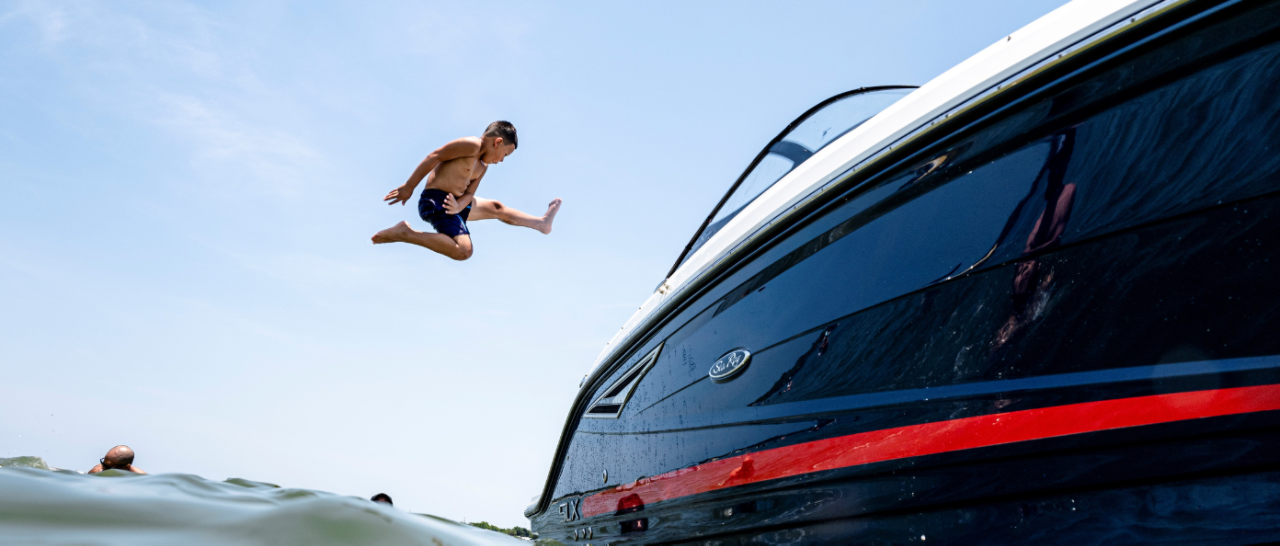The Cost of Boat Ownership Considerations | Boateka

Considering the Cost of Ownership
When buying your boat, you should consider the entire cost of ownership rather than just the price of the boat when setting your budget. Storage, maintenance, insurance, and fuel all contribute to the overall cost of owning a boat. Besides the upfront cost and monthly installments, below are other indirect boat costs you should keep in mind when budgeting for your purchase:
Storage
If you don’t plan to keep your boat at your home or on your property, you should budget for storage costs. If you plan to keep your boat at a marina, you will have to pay a monthly or a seasonal fee. The cost to rent a slip depends on the location of the marina and the size of your boat. Slip costs start at a couple hundred dollars per month and go up from there depending on the size of the slip and amenities. One way to save is to lease the slip for a longer term or purchase it outright. Alternatively, you can opt for dry boat storage, which has its own advantages and is a less expensive alternative to a wet slip.
In colder climates, you will also need winter storage for your boat. Winter storage would typically include winterization prep as well. You can choose between indoor storage, which provides better protection and security, or outdoor storage, which is less expensive and easily available. Indoor storage can cost you anywhere between $50 to $200 per foot for a season, whereas an outdoor storage is more affordable at between $20 to $50 per foot for a season.
Some marinas also include cleaning and maintenance in the fee they charge, so make sure to ask for all the details.
Maintenance
Boats have many moving parts that require periodic maintenance and repairs. It is advisable to budget for oil changes, winterization and other annual services, as well as for any minor damages to the propeller, hull etc. The costs would of course vary depending on the boat type and usage.
To reduce your maintenance costs when buying a used boat, it is critical to find one that is high quality and backed by a reputable business that is transparent about the condition of the boat. A well-refurbished boat from a reputable seller will reduce maintenance surprises and costs over its lifetime. Some of the maintenance costs that you should consider are:
Engine Maintenance
Cleaning
Hull Maintenance
Winterizing (where necessary)
Haul-out
The costs will tend to increase with boat size and engine size. Moreover, boats used in freshwater will have lower maintenance and cleaning costs as compared to those used in saltwater. For budgeting, a rule of thumb for annual maintenance costs for a high quality pre-owned boat is approximately 3% of the cost of the boat.
Insurance
Although boat insurance is not mandatory in most of the states, it is advisable to insure your boat and is required when financing. The cost of insurance for your boat will depend on the boat’s value and the geography where you keep the boat. Generally, coastal areas with year-round boating season and greater storm exposure will have higher premiums as compared to northern states with shorter seasons.
A general rule of thumb is to budget between 1-2% of the boat’s cost as an annual insurance cost, depending on the factors discussed above.
Basic boat insurance sometimes omits coverages such as towing and covering the full replacement cost of the boat in case of total loss. Be sure to look closely at what your policy covers.
Fuel
How much fuel the boat will use depends largely on the engine power, cruising speed and boat size.
A pontoon will generally consume around 5 gallons per hour, whereas a fast bowrider can use up to 25 gallons per hour. Dividing the engine horsepower by 10 for gas engines and by 16 for diesel engines will give you a ballpark cruising speed GPH (gallons per hour) number.
Example: A 150 HP gas engine will consume around 15 gallons of fuel an hour while cruising. So if you enjoy four hour-long cruises with your friends, you would likely use around 60 gallons of gas. Of course, the exact usage would vary depending on the cruising speeds and water conditions, but this can help you plan your fuel spend.
It’s important to note that the price of fuel on water will be higher than you would pay at a gas station for your car. Before using gas from an automotive gas station in your boat, ensure the motor is designed to operate with fuel containing ethanol.
Trailer
A trailer is helpful to transport and store your boat, but will add to your overall upfront cost. If you plan to store your boat onshore and transport it to the waterway, you would need to buy a trailer, the cost of which would depend on the size.
The trailer will also need basic maintenance for tires, brakes and registration, and you may incur monthly storage fees if you are not keeping it on your property.
Equipment & Accessories
You may decide to upgrade your boat with accessories such as an updated sound system, additional lighting, watersports equipment and additional safety gear. Marine electronic technology also evolves every few years and you may choose to keep up to date with the latest features. It is advisable to budget anywhere between 2-5% of the boat’s cost on annual upgrades.
These tools can help you plan ahead for your boat expenses. Our calculations are based on the following assumptions and can vary based on region, boat type, and usage.
Rate: 5.99% is a typical rate for a boat loan, but can fluctuate based on consumer credit history.
Term: 12 years is the typical length of a boat loan.
Insurance: 1.5% of boat price. This can be lower in more seasonal areas, and higher in storm prone areas.


